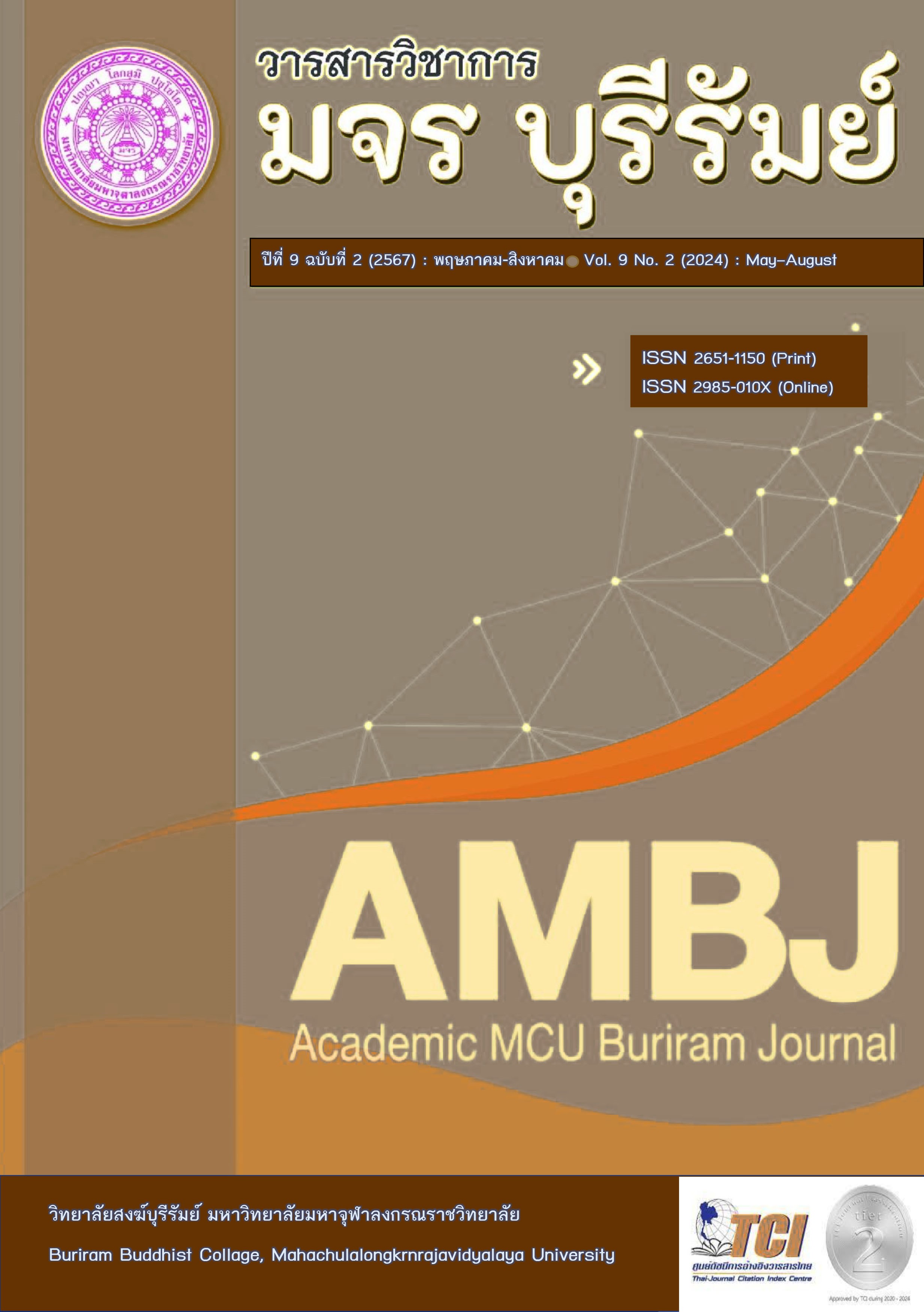Guidelines for Developing Teacher Competencies of School Administrators of Wattrisamakee School in Samut Prakan Primary Educational Service Area Office 1
Keywords:
Guidelines for Development, Teacher CompetenciesAbstract
The purposes of this research were: 1) to study the level of teacher competencies of Wattrisamakee school in Samut Prakan primary educational service area office 1 2) to study the Guidelines for developing teacher competencies of school administrators of Wattrisamakee school in Samut Prakan primary educational service area office 1. The samples were 1) school administrators, 2) deputy administrators, and 3) school teachers. Academic year 2023, 36 people. Experts are highly qualified to provide key information, consisting of educational institution administrators and educational institute administration skills acquired by purposive selection. The research tool was a questionnaire and interview form Statistics used in quantitative data analysis were frequency, percentage, mean, standard deviation.
The research results found that:
1. The level of level of teacher competencies of Wattrisamakee school in Samut Prakan primary educational service area office 1, found that the mean and standard deviation of Overall, level of teacher competencies of Wattrisamakee school in Samut Prakan primary educational service area office 1 were at a high level in all aspects. And when considering each aspect, it was found that it was at the highest average was the Classroom Management and the aspect with the lowest average was the Relationship and Collaborative for Learning.
2. The guidelines for developing teacher competencies of school administrators of Wattrisamakee school in Samut Prakan primary educational service area office 1has 6 areas as follows: 1) Curriculum and Learning Management, administrators should encourage teachers to organize the teaching and learning process in accordance with the goals of teaching and learning as specified by the core curriculum. 2) Student Development, administrators should encourage teachers to plan their teaching and write a plan that can actually be implemented There is an evaluation based on curriculum indicators. Set clear achievement goals. 3) Classroom Management, administrators should clearly set classroom standards. By creating and maintaining a learning environment that will lead to successful teaching and learning. 4) Analysis and Synthesis and Classroom Research, administrators should establish policies and plans related to research. By allowing teachers to conduct research in the classroom. 5) Teacher Leadership, administrators should assign teachers to be department heads or chairpersons of important projects in order to practice learning how to work as leaders and provide opportunities for teachers to participate in educational institution development. and 6) Relationship and Collaborative for Learning, administrators should encourage teachers to interact with parents and participate in community activities.
References
จารุวรรณ จันเลือน. (2557). แนวทางการพัฒนาสมรรถนะครูสังกัดองค์การบริหารส่วนจังหวัดในเขตจังหวัดภาคเหนือ. วิทยานิพนธ์ครุศาสตรมหาบัณฑิต สาขาวิชาการบริหารการศึกษา. บัณฑิตวิทยาลัย: มหาวิทยาลัยราชภัฏพิบูลสงคราม.
ทิวัตถ์ เทียนศิริ และมัทนา วังถนอมศักดิ์. (2566). แนวทางการพัฒนาสมรรถนะของครูโรงเรียนวัดโพรงมะเดื่อ (ศรีวิทยากร). วารสารการบริหารการศึกษามหาวิทยาลัยศิลปากร, 14(2), 55-69.
ธฤตมน บุญญานนท์ และวรชัย วิภูอุปรโคตร. (2563). แนวทางการพัฒนาสมรรถนะประจำสายงานขอครูผู้สอนในโรงเรียน สังกัดสำนักงานเขตพื้นที่การศึกษามัธยมศึกษาเขต 17 จังหวัดจันทบุรี. วารสารบริหารการศึกษา มหาวิทยาลัยขอนแก่น, 16(2), 42-52.
บุญชม ศรีสะอาด. (2545). การวิจัยเบื้องต้น. พิมพ์ครั้งที่ 7. กรุงเทพมหานคร: สุวีริยาสาส์น.
พิณสุดา สิริธรังศรี. (2557). รายงานการสังเคราะห์องค์ความรู้การยกระดับคุณภาพครูไทยในศตวรรษที่ 21. เอกสารประกอบการประชุมวิชาการ อภิวัฒน์การเรียนรู้สู่จุดเปลี่ยนประเทศไทย. วิทยาลัยครุศาสตร์มหาวิทยาลัยธุรกิจบัณฑิตย์.
เพ็ญประกาย สุขสังข์. (2563). สภาพและแนวทางการพัฒนาสมรรถนะประจำสายงานครูในสถานศึกษาขนาดเล็ก สังกัดสำนักงานเขตพื้นที่การศึกษาประถมศึกบุรีรัมย์ เขต 2. วิทยานิพนธ์ครุศาสตรมหาบัณฑิต สาขาวิชาการบริหารการศึกษา. บัณฑิตวิทยาลัย: มหาวิทยาลัยราชภัฏบุรีรัมย์.
มลฤดี ศรีสานต์ และคณะ. (2563). บทบาทผู้บริหารสถานศึกษาในการพัฒนาสมรรถนะครูในศตวรรษที่ 21 สังกัดสำนักงานเขตพื้นที่การศึกษาประถมศึกษาอุบลราชธานี เขต 5. วารสารการบริหารการศึกษาและภาวะผู้นำ มหาวิทยาลัยราชภัฏสกลนคร, 8(30), 229-238.
เย็นฤทัย จงถนอม. (2561). การเสริมสร้างสมรรถนะในงานของครู กรณีโรงเรียนเอกชนในเขตดุสิต กรุงเทพมหานคร. วิทยานิพนธ์ศึกษาศาสตรมหาบัณฑิต สาขาวิชาการจัดการการศึกษา. บัณฑิตวิทยาลัย: มหาวิทยาลัยธุรกิจบัณทิตย์.
วรรญา สิงห์ทอง และนงลักษณ์ ใจฉลาด. (2560). การศึกษาสภาพและแนวทางการพัฒนาสมรรถนะครูในสถานศึกษา สังกัดสำนักงานเขตพื้นที่การศึกษาประถมศึกษาสุโขทัย เขต 1. วารสารมหาวิทยาลัยราชภัฏลำปาง, 6(1), 118-128.
สุภาพรรณ ธะยะธง. (2562). การศึกษาสมรรถนะของครูในสถานศึกษาขั้นพื้นฐาน สังกัดสำนักงานเขตพื้นที่การศึกษาประถมศึกษาเชียงราย เขต 2. วิทยานิพนธ์การศึกษามหาบัณฑิต สาขาวิชาการบริหารการศึกษา. บัณฑิตวิทยาลัย: มหาวิทยาลัยพะเยา
สานิตา แดนโพธิ์. (2560). สมรรถนะครูโรงเรียนวัดไผ่ล้อม (พูลประชาอุปถัมภ์). วิทยานิพนธ์ศึกษาศาสตรมหาบัณฑิต สาขาวิชาการบริหารการศึกษา. บัณฑิตวิทยาลัย: มหาวิทยาลัยศิลปากร.
สำนักงานคณะกรรมการการศึกษาขั้นพื้นฐาน. (2553). คู่มือการประเมินสมรรถนะครู (ฉบับปรับปรุง). กรุงเทพมหานคร: สำนักพัฒนาครูและบุคลากรทางการศึกษาขั้นพื้นฐาน.
สำนักงานเลขาธิการสภาการศึกษา กระทรวงศึกษาธิการ. (2560). แผนการศึกษาแห่งชาติ พ.ศ. 2560-2579. กรุงเทพมหานคร: พริกหวานกราฟฟิค.
Krejcie, Robert V., & Morgan, Daryle W. (1970). Determining sample size for research activities. Education and Psychological Management, 30(3), 607-610.
Downloads
Published
How to Cite
Issue
Section
License
Copyright (c) 2024 Academic MCU Buriram Journal

This work is licensed under a Creative Commons Attribution-NonCommercial-NoDerivatives 4.0 International License.
ทัศนะและความคิดเห็นที่ปรากฏในบทความวารสารฉบับนี้ถือเป็นความรับผิดชอบของผู้เขียนบทความนั้น ไม่ถือเป็นทัศนะและความรับผิดชอบของบรรณาธิการ





